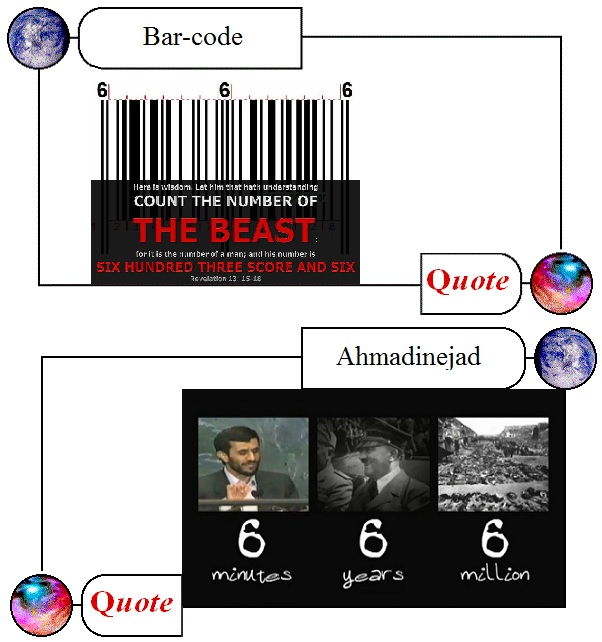666.6 recurring?
[ by Charles Cameron ]
I’m hoping to give an extended treatment to Glenn Beck’s new documentary on Mahdism and Iranian nuclear ambitions shortly, not because I think Mahdism is unimportant – I don’t – but because I don’t think Beck is listening to some of the people with the most in-depth knowledge of the situation.
In the meantime, I couldn’t resist the screen-grab from the docu in Quote #2, which accompanied Joel Rosenberg saying:
This end times theology is not only what he believes, but it is why Ahmadinejad is putting his foot to the gas of accelerating Iran’s nuclear weapons development program, and the ballistic missile development as well – because once Ahmadinejad is able to acquire nuclear weapons and the missiles to deliver them, Ahmadinejad could do in about six minutes what it took Adolf Hitler about six years to do, and that is to kill 6 million Jews.
You can have Nero for 666, or Aleister Crowley, or Ronald Wilson Reagan, or this Pope or any previous holder of that title, or Muhammad, or bar codes, or Ahmadinejad – but surely not all of them at once.
*
I’m shifting from talk about 666, the number of the Beast, to talk about the Antichrist now — which may or may not be a different topic, see for instance these notes from Scofield on Revelation…
*
Joel Richardson, an email friend of mine who is the author of The Islamic AntiChrist and is featured in the documentary, believes the Antichrist and the Mahdi are one and the same: he calls the expectation of the Mahdi’s coming an “anti-parallel” of Christian expectation of the Second Coming of Christ, and says “Islam has literally taken the whole story and flipped it on its head”. Joel Rosenberg, whose latest thriller is titled The Twelfth Imam, and who is also featured, says that in his view the Mahdi may be “an” – but not “The” – Antichrist.
*
Back to the Beast:
Rev. Ian Paisley, Baron Bannside, still says 666 is the Pope — but then he’s both a minister of religion and a Unionist politician from Northern Ireland.




January 30th, 2011 at 5:50 am
They gave Paisley a Barony??? Was that to shut him up and sign the accords? Tell me it was a life peerage and not a hereditary one.
.
Of course, on the British scale, the English titles outweighed the Scottish and Anglo-Irish peerages, excepting certain Scottish noble houses that kept unique prerogatives ( technically, the Duke of Atholl can field his own private army and maintains this right with a ceremonial unit, a marching band or something of that nature).
January 30th, 2011 at 9:37 am
I hadn’t heard about it myself until I was writing up this post, Zen. According to Wikipedia:
That’s about all I know.
.
My own interest stems from the clarity which his writings about the Pope as Antichrist bring to the question of whether the Troubles were “really" politics and only "superficially" about religion:
For the Catholic side, see Martin Dillon, God and Gun: The Church and Irish Terrorism, which is full of revealing quotes. I haven’t had time to read Marcus Tanner, Ireland’s Holy Wars: The Struggle for a Nation’s Soul 1500-2000 as yet, but I gather that it illustrates the same point in a longer historical perspective.
.
On the Protestant side, in the mind of Paisley if no-one else, the battle is not only political but deeply religious — and nor merely religious but specifically apocalyptic.
January 30th, 2011 at 8:01 pm
The lineage of thinking embraced by Paisely is familiar to me. The Scofield/Larkin interpretations (they are quite complimentary) are among the most "plausible" I’ve read with respect to "end times" as depicted in the Bible. If the prophecy is true, however, that reference of Christ returning like "a thief in the night" keeps coming to mind. I heard Paisely speak in person once about 25 years ago and he was speaking on the end time. This theme is not new to him.
January 31st, 2011 at 5:42 am
I’m glad you chimed in, Scott — I meant to email you inviting you to do so, but have been busy with my kids all weekend.
.
You heard Paisley? At a revival? in Ireland, or in the States?
.
I’m no great fan of the back-and-forth maimings and killings of recent Irish history on either side, but have read that as a pastor Paisley was a loyal and generous friend — I just wouldn’t want to have been within the focus of his hatred.
January 31st, 2011 at 10:27 am
Whatever his religious convictions, he showed himself to be a canny and flexible operator, who managed to work quite well with his political enemies in government…but still:
.
http://www.youtube.com/watch?v=7Fm0QOIw8nQ
January 31st, 2011 at 3:47 pm
Charles, I heard Paisley at a talk in Virginia Beach in the 80’s; he had a great following in the fundamental Baptist movement. From a theology perspective I found clarity in his thought (as I said above; he subscribed to the Scofield/Larkin model)—even if his rhetoric on politics had a tone with which I was, and remain, unfamiliar—only to the extent of his list of grievances and visceral hostility. He seemed to wrap the Great Commission into his political cause. If you are interested, I found Dwight Pentecost’s Things to Come (which I read ages ago) a good modern representation of a more fundamental eschatology—Paisley would probably call Pentecost a "modernist," but I believe he managed to bring both Scofield and Larkin into a clearer light.